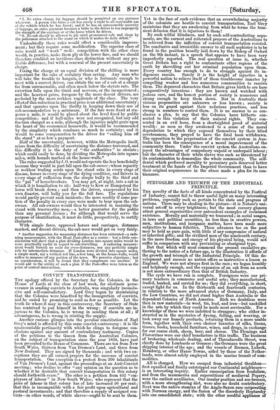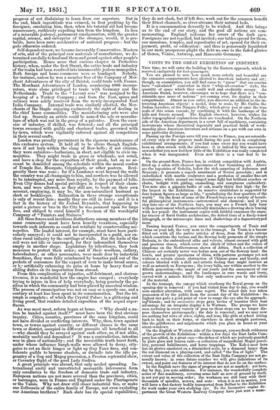STRUGGLES AND TRIUMPH OF THE INDUSTRIAL PRINCIPLE.
THE novelty of the facts of all kinds concentrated by the Festival of Industry, cannot fail to throw useful light on many interesting problems, especially such as pertain to the state and progress of nations. There may be shading in the picture—it is Nature's uni- versal set-off to every brightness; but the most cursory glances attest general superiorities over antecedent examples of reclaimed existence. Morally and materially we transcend ; in social usages, in laws and political securities, no less than in creativepowers, men, institutions, and inorganic matter, have been made more, subjective to human felicities. These advances too on the past may be held as pure gain, with little if any compromise of natural or inherited gifts; and the civilized man of the nineteenth century, in the mere freedom and energy of his physical being, would not suffer in comparison with any preexisting or aboriginal type.
But that which will most commend the present emulative ga- thering to the notice of a future age, is the illustration it affords of the growth and triumph of the Industrial Principle. Of this de- velopment and success no nation offers so instructive a lesson as England. We were not always first in the race ; we began humbly and helplessly enough, and the expansion of an oak from an acorn is not more extraordinary than that of British Industry. The cycle we have run is complete. Foreigners were our pri- mary teachers in commerce and useful arts; they manufactured, traded, banked, and carried for us • they did everything, in short, except fight for us. In the thirteenth and fourteenth centuries, in relation to the more advanced states of Germany, Italy, and the Low Countries, we did not stand higher than Australia or the dependent Colonies of North America. Rich we doubtless were then in raw materials—in wool, tin, lead, and iron—but unskilled in the arts by which they could be made most serviceable. For a knowledge of these we were indebted to strangers; who either in- structed us in the mysteries of dyeing, fulling, and weaving, or took away our homely products, returning them in a more usable form, together with their own choicer luxuries of silks, linens, tissues, books, household furniture, wines, and drugs, in exchange for our coarse cloth, sheep, beer, and cheese. The Flemings and Florentines were our chief benefactors in this traffic. The business of brokering, wholesale dealing, and of Threadneedle Street, was chiefly done by Lombards or Genoese ; the Germans were the great shipping interest of the age ; and the vessels of Bremen, Lubeck, Hamburg, or other Hanse Towns, aided by those of the Nether- lands, were almost solely employed in the marine transit of com- modities.
All is changed. How we escaped from industrial thraldom— first equalled and finally outstripped our Continental neighbours— is an interesting inquiry. Earlier emancipation from feudalism, and from the mummeries and superstitions of mediteval Popery, were the earliest auxiliaries. Our insular position and sea-breezes, with a more strengthening diet, were also no doubt contributory. Next was the native stamina of the Anglo-Saxon race cooperating, with Norman energy, and the fusion of the disorderly Heptarehy into one consolidated state ; with the other needful appliance of
progress of not disdaining to learn from our superiors. But in the end, black ingratitude was evinced, in first profiting by the foreigner, emulating him, then, when his tutorial aid had become unnecessary, ruthlessly expelling him from the kingdom. In lieu of a miserable jealousy, permanent amalgamation, with the greater capital, science, and enterprise of the stranger, would, it is pro- bable, have been more accelerative of national progress : but the gods otherwise ordered.
Self-dependent now, we became inexorably Conservative. Masters of arts, and of the principal raw materials of manufacture, we de- termined carefully to husband them and guard against other people's participation. Hence arose that curious chapter in Protective history, when, under the first Stuart, the entire trade and industry of the realm had been resolved into innumerable jealous monopolies. Both foreign and home commerce were so bandaged. Nobody, for instance, unless he was a member free of the Company of Mer- chant Adventurers of the city of Bristol, could trade with France. The Merchant Adventurers of London, numbering 4000 incorpo- rators, were alone privileged to trade with Germany and the Netherlands. Trade to the "Levant seas" was assigned to the keeping of a Turkey Company ; and from the East, spices and calicoes were solely received from the newly-incorporated East India Company. Internal trade was similarly allotted, the Mer- chants of the Staple enjoying exclusively the right of dealing in the chief home commodities. The manufacturing arts were also tied up. Scarcely an article could be named the sale or manufac- ture of which was not in the grasp of a patentee. Even the exer- cise of industry, if skilled, was fettered ; and all the principal towns swarmed with guilds and chartered trades, governed with by-laws, which were vigilantly enforced against all competitors in their several crafts.
London was proudly preeminent in the rigorous maintenance of this exclusive system. It held all to be aliens though English- men if not born within the clang of Bow-bells ; if not citizens, they were outsiders—barbarians, in short, not eligible to civic im- munities. They might trade in gross or wholesale, not retail, and have a shop for the exposition of their goods, but on no ac- count be domiciled among the celestials within the mural cordon of Temple Bar, Moorgate, Cripplegate, or other postern. Reci- procity there was none ; for if a Londoner went beyond the walls the country was all champaign to him, and nowhere was he allowed to be interrupted, any more than royalty, by the payment of tolls. Even City dames had special privileges in respect of their chain- hers, and were allowed, as they still are, to trade on their own account, employing, it may be, the non-naturalized husband as clerk or bookkeeper. Relaxation in these strange exceptionals is only of recent date ; mostly they are still in force ; and it is a fact in the history of Sir Joshua Reynolds, that happening to paint a picture or two in the City he was pounced upon for large fees, and obliged to enrol himself a freeman of the worshipful Company of "Painters and Stainers." All these fences and invidious distinctions among members of the same community must have been heavily vexatious, especially towards such interests as could not retaliate by countervailing mo- nopolies. The landed interest, for example, must have been parti- cularly annoyed ; it could not be incorporated in a guild, nor en- close rural industry by the curtilage of walls. But the lords of the soil were not idle or unavenged, for they indemnified themselves amply in another shape. Legislators by inheritance, they took measures to protect their order; and if their woollens, cutlery, haberdashery, or other necessaries, were made dear by industrial franchises, they were fully reimbursed by bounties paid out of the pockets of consumers for the export of corn to make bread scarce, or by artificially enhancing its price at home by heavy fixed or sliding duties on its importation from abroad. From this complication of injustice, self-detriment, and obstruc- tiveness, it is wonderful how the empire has escaped ; everybody trying to injure in lieu of help everybody, being precisely the po- sition in which the community had been placed by ancestral wisdom. The process of emancipation was not an easy or a speedy one, and a century at least has been spent in its consummation. But the tri- umph is complete ; of which the Crystal Palace is a glittering and living proof, that renders detailed exposition of the sequel super- fluous.
As was most meet, reform began at home. " Why should a na- tion be banded against itself ?" must have been the first obvious inquiry. Cities, counties, provinces of the same kingdom, could not have divided or conflicting interests. Why, then, town against town, or towns against country, or different classes in the same town or district, occupied in different pursuits all beneficial to all —why should they be arrayed against each other, as, if not alike, mutually useful and dependent ? It was a contradiction, intestine war in place of nationality ; and the irresistible truth burst forth, under whose influence burgh-walls were allowed to decay, city- gates to rot on their hinges or light up Guy Faux fires, and con- federate guilds to become obsolete, or dwindle into the idle pa- geantry of a Gog and Magog procession, a Preston septennial show, or Coventry flight of the good Lady Godiva. A great principle was abroad, that only needed spreading. In- ternational amity and unrestricted mercantile intercourse form only corollaries to the freedom of domestic trade and industry, European nations are not more severed than the provinces, cities, or baronages, were in France and England under the Plantagenets or the Valois. Why not draw still closer industrial ties, or make one Zollverein of the entire family of Europe, not even excluding our American brethren ? Each state has its special capabilities ; they do not clash, but if left free, work out for the common benefit their fittest channels, as river-streams their natural beds.
It is a consummation devoutly to be wished. And this brings us to the end of our story, and the goal all nations are com- memorating. England redeems her errors of the dark ages. Foreigners are not repelled, but invited; our tables spread for them, our mansions, temples, and repositories of art, opened for their en- joyment, profit, or edification : and thus is generously liquidated in our more prosperous plight the debt we owe to the faded gleries of Genoa, Venice, Antwerp, and Hanseatic Germany.



























 Previous page
Previous page